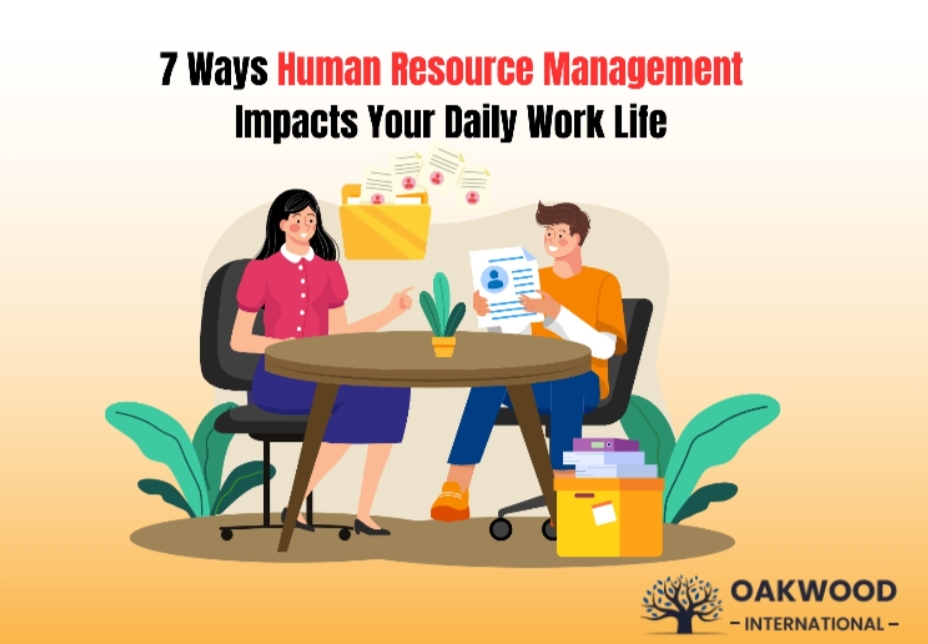Have you ever wondered why your workday feels organised, your voice gets heard, or even why training arrives when needed? For those studying the CIPD Level 5 Associate Diploma in People Management, the answer often lies in understanding What is Human Resource Management and how deeply it shapes our daily working lives. From morning meetings to annual reviews, HRM plays a silent but powerful role.
Let’s explore its real impact on your everyday work experience without you even noticing.
Table of Contents
• Builds a Fair and Inclusive Culture
• Keeps Communication Flowing Smoothly
• Drives Career Growth and Training
• Ensures Your Well-Being Is a Priority
• Solves Conflicts Before They Escalate
• Handles Pay, Perks and Benefits
• Makes Performance Reviews Worth Your Time
• Conclusion
1. Builds a Fair and Inclusive Culture
HRM is essential to creating inclusive and equitable work environments. It assists in removing obstacles that could otherwise be overlooked by implementing laws that promote equality and diversity. HR fosters inclusivity through transparent recruiting procedures, diversity education, and unambiguous conduct guidelines. These efforts make you feel valued, heard, and free to express yourself. HR also monitors team behaviour to ensure nobody gets left behind. In addition to boosting morale, a strong sense of justice promotes improved teamwork and long-term retention.
2. Keeps Communication Flowing Smoothly
Effective communication is not something that just happens. To keep everyone in agreement, HR develops mechanisms. HR ensures you receive information in a clear and timely way, whether it’s leadership messaging, internal adjustments, or new policy updates. They also set up avenues, like surveys or one-on-one check-ins, for you to voice your opinions or concerns. Thanks to these communication systems, everyone can feel included in the larger picture, and misunderstandings are avoided. This continuous exchange of information improves departmental team alignment and fosters trust.
3. Drives Career Growth and Training
When did you last participate in a training session or attend a workshop? Your human resources department probably set it up. Through learning opportunities, human resource management attempts to fill skill gaps. Anything from leadership coaching to technical training could fall under this category. HR keeps workers engaged and helps them realise their potential by fostering personal development. They also help you with development plans, assessments, and career routes. Teams that receive the proper training grow more self-assured, effective, and driven to give their best effort.
4. Ensures Your Well-Being Is a Priority
Although work can be taxing, HR is concerned with more than corporate results. One of their primary duties is to ensure your well-being. They create programmes that address individual requirements, encourage work-life balance, and support mental health. HR ensures you can access services supporting your health, including remote work choices, paid leave for personal emergencies, or therapy. They also monitor stress levels and workloads. Feeling balanced and supported makes you more likely to remain dedicated, focused, and motivated at work.
5. Solves Conflicts Before They Escalate
Every workplace occasionally experiences conflicts. HR’s job is to intervene before problems escalate into major conflicts. They hear issues, resolve disputes, and provide reasonable answers. HR also establishes mechanisms such as grievance procedures and conflict resolution rules to provide a safe environment for employees to voice their concerns. This method fosters mutual respect, eases stress, and promotes transparency. A courteous and peaceful settlement keeps teams cohesive and promotes harmony.
6. Handles Pay, Perks and Benefits
HR meticulously manages your pay, incentives, and company benefits behind the scenes. They handle employee benefits like insurance or discounts, help manage holiday entitlements, and ensure you get paid accurately and on schedule. Additionally, HR informs you of any modifications to these benefits. Their meticulousness keeps errors at bay and fosters organisational trust. Employee motivation remains high when they receive fair and open rewards.
7. Makes Performance Reviews Worth Your Time
HR helps make performance assessments useful, even though they might occasionally feel like a formality. They teach managers how to create attainable goals and provide constructive criticism. Reviews become two-way discussions that point out your areas of strength and growth as a result. Additionally, they promote frequent one-on-one meetings rather than only yearly check-ins. These methodical but intimate evaluations give you direction, clarity, and a sense of accomplishment. They demonstrate that you are a person whose work matters and not just a number.
Conclusion
Your everyday work life is influenced more by HR than you might realise. From communication to personal growth, HR shapes how you experience your job. For those looking to master these areas, a CIPD Level 5 Associate Diploma in People Management offers the perfect foundation. A course by Oakwood International can guide you in leading these practices with purpose and impact.
Enjoyed this? Share this post with fellow fans and influencers, and be sure to check back regularly for the latest updates, insights, and news on all things simpcity!
